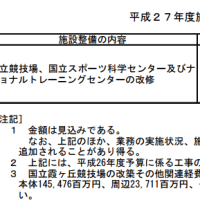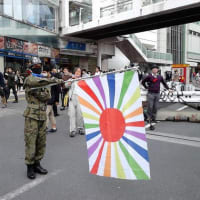去年、アフリカ西部を拠点(?)に世界各国で大騒動を引き起こしたエボラ出血熱の感染拡大。
この感染拡大を防ぐため、医療機関や医療関係者の人達は相当必死に対応していた(と思う)。
その努力のかいがあったかどうか知らんが、この状況に変化が出てきたっぽい・・・。
・WHO「エボラ終息向け新たな段階」(2015年1月30日 nhk.or.jp)
依然としてエボラ出血熱のウィルスに感染する人達はそれなりにいるってのを忘れてはいけないこの話。
以下、2015年1月30日分 nhk.or.jp『WHO~』を全文(略)
---- 以下引用 ----
過去最悪の感染規模となった西アフリカでのエボラ出血熱の流行について、WHO=世界保健機関は29日、新たに感染する人の数が大幅に減っているとして、「終息を目指す新たな段階に入った」という認識を示しました。
WHOは29日、エボラ出血熱を巡る最新の状況を発表し、西アフリカのシエラレオネ、リベリア、ギニアで今月25日までの1週間に感染した人の数は99人だったことを明らかにしました。
感染が急速に拡大していた去年秋には、1週間当たりおよそ1000人のペースで感染者が増加しており、1週間あたりの新たな感染者数が100人を下回ったのは、去年6月末以降初めてです。
このためWHOは、「エボラ出血熱への対応は新たな段階に入った。焦点は感染拡大を抑えることから、流行を終息させることに移った」という認識を示しました。
そして、流行を終息させるためには、感染者や感染者と接触した人を確実に把握することが重要だと強調しました。
WHOによりますと、西アフリカの3か国で感染または感染した疑いがある人は、これまでに2万2057人に上り、このうち8795人が死亡しました。
---- 引用以上 ----
これ自体は悪い話じゃないとはいえ、ここに辿りつくまでのWHOや世界各国の対応には問題があった模様。
その辺は、今月25日に行われた緊急会議でWHO自身が認めてたのだが・・・。
・「エボラ対応の過ちを教訓にすべき」WHO局長(2015年1月26日 afpbb.com)
以下、2015年1月26日分 afpbb.com『「エボラ対応の過ちを教訓にすべき」~』から前半部分を(略)
---- 以下引用 ----
【1月26日 AFP】
国連(UN)世界保健機関(World Health Organization、WHO)のマーガレット・チャン(Margaret Chan)事務局長は25日、同機関がエボラ出血熱に不意を突かれたことを認め、将来に同じ過ちを繰り返さないようにするための教訓とするべきとの見解を示した。
チャン事務局長は異例の開催となったWHO緊急会議の席上で、エボラとの闘いで危機を脱しつつある状況にあるにもかかわらず、現状に甘んじている余裕はないと述べた。
またエボラの流行に対するWHOの対応が遅く粗雑であったとの厳しい指摘を認め、同機関の危機管理手法を改革する必要性を訴えた。
同事務局長は、緊急会議に出席した各国代表を前に「西アフリカにとって、エボラウイルスに襲われるのは今回が初めての経験であり、非常に大きな動揺と驚きをもたらすものだった」と指摘し、「WHOを含む世界の対応があまりに遅かったため、眼前で展開されている事態を認識できなかった」と語った。
同会議が開かれるのは、WHO史上で今回がまだ3回目だ。
また「状況を上向きに転じさせ、最悪の事態を避けられたことを、データは示している」としながら、エボラの流行が「WHOを含む世界に対して、今後、同様の事象の発生をいかに回避すべきかといった多くの教訓を与えた」と続けた。
さらに「予測が非常に困難な微生物界は、常に驚きを与えるものだ。世界は、不意を突かれて驚きに見舞われる事態を二度と繰り返さないようにするべきだ」とも述べている。
AFPの取材では「2015年の優先事項は、各国がエボラ感染率をゼロに近づけるのを助けることだ」と述べた。
(以下略)
---- 引用以上 ----
WHOや医療機関とかの対応の遅れで一番被害を受けたのは、言うまでもなく感染が拡大した地域に住んでる人達。
その辺りは、Ebola Response Anthropology Platform というサイト(人類学の視点によるエボラ出血熱対策を考察するのが目的・・・らしい)にが公表していた調査結果でも記されていた。
・Community-Centered Responses to Ebola in Urban Liberia: The View from Below(ecola-anthropology.net;.pdfファイル)
・Ebola - is culture the real killer?(2015年1月29日 irinnews.org;前半で調査結果を引用している)
この調査は、リベリアのいくつかの地域を対象に、エボラ出血熱への対処の実態や治った人達の扱い等について行っていた。
そこには、地域で中心的役割を果たす人達が対応に苦慮していたことを示す記述が・・・。、
以下、ecola-anthropology.net『Community-Centered Responses to~』から、P.13-P.14の一部を(略)
---- 以下引用 ----
(中略)
B. Response and Treatment
Nearly all of the demands for the infrastructure improvements noted above derived from the experience of and local reports of failed response in the months of July, August, and September 2014.
When community leaders called for the creation of a communications infrastructure, it was because their calls to hotlines had gone unanswered.
When they called for the training of community members to provide care to the sick, manage holding centers, administer quarantines, and isolate or bury the dead, it was because they had experienced the social, medical, and ecological consequences of response teams not arriving in a timely manner or failing to arrive all.
Moreover, the anonymity of the removal process terrified individuals, and played a role in their decisions to avoid ETUs[引用者注:Ebola Treatments Units、要はエボラ出血熱の患者を収容する施設] and hospitals and to engage in secret burials.
In one case, a community leader reported losing an infected individual who had left the community for an “unknown destination.”
After going from hospital to hospital, there was no record of that individual’s registration, death, or departure.
Consequently, when community leaders engaged in discussions of “best practices” regarding response and treatment, it must be acknowledged that community leaders agreed that the true “best response” was to obtain care in a hospital or ETU, to seek the removal of sick individuals by health care teams working for the government, and to engage in proper burials that reduced disease transmission.
But, absent the likelihood that these resources were going to be in place, community leaders engaged in positive deviance in the sense that a process of recommendations for how a community might best manage the presence of Ebola infection, and the disposal of infectious corpses.
In the absence of open clinics and hospitals, residents are trying to assume responsibility for all aspects of healthcare in their local communities.
Everything that follows in this section builds upon this premise.
(以下略)
---- 引用以上 ----
エボラウィルスの感染拡大に本来必要な処置が間に合わないってのは、結局の所リベリア政府の(医療体制に関する)対応の悪さが原因なのかもしれん。
もっと言えば、そうした状況にある国や地域に適切な支援を行なわかったもしくは行えなかったWHOや世界各国の責任になるわけだが・・・。
この感染拡大を防ぐため、医療機関や医療関係者の人達は相当必死に対応していた(と思う)。
その努力のかいがあったかどうか知らんが、この状況に変化が出てきたっぽい・・・。
・WHO「エボラ終息向け新たな段階」(2015年1月30日 nhk.or.jp)
依然としてエボラ出血熱のウィルスに感染する人達はそれなりにいるってのを忘れてはいけないこの話。
以下、2015年1月30日分 nhk.or.jp『WHO~』を全文(略)
---- 以下引用 ----
過去最悪の感染規模となった西アフリカでのエボラ出血熱の流行について、WHO=世界保健機関は29日、新たに感染する人の数が大幅に減っているとして、「終息を目指す新たな段階に入った」という認識を示しました。
WHOは29日、エボラ出血熱を巡る最新の状況を発表し、西アフリカのシエラレオネ、リベリア、ギニアで今月25日までの1週間に感染した人の数は99人だったことを明らかにしました。
感染が急速に拡大していた去年秋には、1週間当たりおよそ1000人のペースで感染者が増加しており、1週間あたりの新たな感染者数が100人を下回ったのは、去年6月末以降初めてです。
このためWHOは、「エボラ出血熱への対応は新たな段階に入った。焦点は感染拡大を抑えることから、流行を終息させることに移った」という認識を示しました。
そして、流行を終息させるためには、感染者や感染者と接触した人を確実に把握することが重要だと強調しました。
WHOによりますと、西アフリカの3か国で感染または感染した疑いがある人は、これまでに2万2057人に上り、このうち8795人が死亡しました。
---- 引用以上 ----
これ自体は悪い話じゃないとはいえ、ここに辿りつくまでのWHOや世界各国の対応には問題があった模様。
その辺は、今月25日に行われた緊急会議でWHO自身が認めてたのだが・・・。
・「エボラ対応の過ちを教訓にすべき」WHO局長(2015年1月26日 afpbb.com)
以下、2015年1月26日分 afpbb.com『「エボラ対応の過ちを教訓にすべき」~』から前半部分を(略)
---- 以下引用 ----
【1月26日 AFP】
国連(UN)世界保健機関(World Health Organization、WHO)のマーガレット・チャン(Margaret Chan)事務局長は25日、同機関がエボラ出血熱に不意を突かれたことを認め、将来に同じ過ちを繰り返さないようにするための教訓とするべきとの見解を示した。
チャン事務局長は異例の開催となったWHO緊急会議の席上で、エボラとの闘いで危機を脱しつつある状況にあるにもかかわらず、現状に甘んじている余裕はないと述べた。
またエボラの流行に対するWHOの対応が遅く粗雑であったとの厳しい指摘を認め、同機関の危機管理手法を改革する必要性を訴えた。
同事務局長は、緊急会議に出席した各国代表を前に「西アフリカにとって、エボラウイルスに襲われるのは今回が初めての経験であり、非常に大きな動揺と驚きをもたらすものだった」と指摘し、「WHOを含む世界の対応があまりに遅かったため、眼前で展開されている事態を認識できなかった」と語った。
同会議が開かれるのは、WHO史上で今回がまだ3回目だ。
また「状況を上向きに転じさせ、最悪の事態を避けられたことを、データは示している」としながら、エボラの流行が「WHOを含む世界に対して、今後、同様の事象の発生をいかに回避すべきかといった多くの教訓を与えた」と続けた。
さらに「予測が非常に困難な微生物界は、常に驚きを与えるものだ。世界は、不意を突かれて驚きに見舞われる事態を二度と繰り返さないようにするべきだ」とも述べている。
AFPの取材では「2015年の優先事項は、各国がエボラ感染率をゼロに近づけるのを助けることだ」と述べた。
(以下略)
---- 引用以上 ----
WHOや医療機関とかの対応の遅れで一番被害を受けたのは、言うまでもなく感染が拡大した地域に住んでる人達。
その辺りは、Ebola Response Anthropology Platform というサイト(人類学の視点によるエボラ出血熱対策を考察するのが目的・・・らしい)にが公表していた調査結果でも記されていた。
・Community-Centered Responses to Ebola in Urban Liberia: The View from Below(ecola-anthropology.net;.pdfファイル)
・Ebola - is culture the real killer?(2015年1月29日 irinnews.org;前半で調査結果を引用している)
この調査は、リベリアのいくつかの地域を対象に、エボラ出血熱への対処の実態や治った人達の扱い等について行っていた。
そこには、地域で中心的役割を果たす人達が対応に苦慮していたことを示す記述が・・・。、
以下、ecola-anthropology.net『Community-Centered Responses to~』から、P.13-P.14の一部を(略)
---- 以下引用 ----
(中略)
B. Response and Treatment
Nearly all of the demands for the infrastructure improvements noted above derived from the experience of and local reports of failed response in the months of July, August, and September 2014.
When community leaders called for the creation of a communications infrastructure, it was because their calls to hotlines had gone unanswered.
When they called for the training of community members to provide care to the sick, manage holding centers, administer quarantines, and isolate or bury the dead, it was because they had experienced the social, medical, and ecological consequences of response teams not arriving in a timely manner or failing to arrive all.
Moreover, the anonymity of the removal process terrified individuals, and played a role in their decisions to avoid ETUs[引用者注:Ebola Treatments Units、要はエボラ出血熱の患者を収容する施設] and hospitals and to engage in secret burials.
In one case, a community leader reported losing an infected individual who had left the community for an “unknown destination.”
After going from hospital to hospital, there was no record of that individual’s registration, death, or departure.
Consequently, when community leaders engaged in discussions of “best practices” regarding response and treatment, it must be acknowledged that community leaders agreed that the true “best response” was to obtain care in a hospital or ETU, to seek the removal of sick individuals by health care teams working for the government, and to engage in proper burials that reduced disease transmission.
But, absent the likelihood that these resources were going to be in place, community leaders engaged in positive deviance in the sense that a process of recommendations for how a community might best manage the presence of Ebola infection, and the disposal of infectious corpses.
In the absence of open clinics and hospitals, residents are trying to assume responsibility for all aspects of healthcare in their local communities.
Everything that follows in this section builds upon this premise.
(以下略)
---- 引用以上 ----
エボラウィルスの感染拡大に本来必要な処置が間に合わないってのは、結局の所リベリア政府の(医療体制に関する)対応の悪さが原因なのかもしれん。
もっと言えば、そうした状況にある国や地域に適切な支援を行なわかったもしくは行えなかったWHOや世界各国の責任になるわけだが・・・。



















